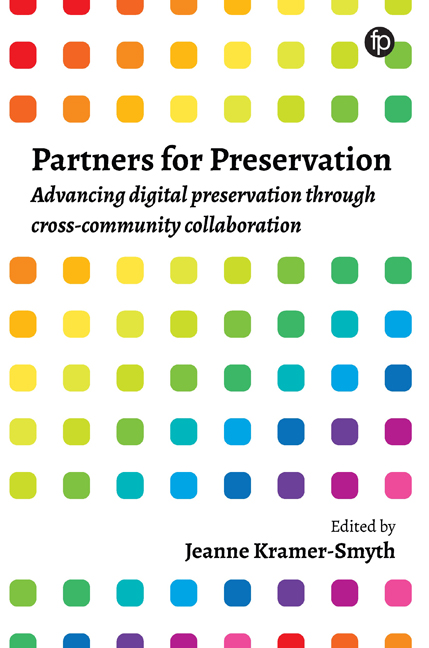Final thoughts
Published online by Cambridge University Press: 08 June 2019
Summary
I am an optimist, but I think I am not being naive to propose that the list of potential ‘partner professions’ for archivists concerned with digital preservation is very long. This is not a one way street. We are not the only ones who will benefit from such partnerships.
The promise of collaboration across professions is something many are pursuing.
The popular TED (Technology, Entertainment, Design) conferences and related online videos grew out of cross-collaboration at the intersection of technology, entertainment and design. Now their ‘TED Fellows program provides transformational support to an inter - national community of 436 visionaries who collaborate across disciplines to create positive change around the world’ (TED, n.d.).
Not everyone is going to be able to seek partners from other sectors with whom to join forces in their digital preservation work. What is more feasible is for those in the R&D arm of the profession to be creative in their hunt for similar challenges already being tackled in the private sector.
By the time you read this section, I am assuming you have read the preceding chapters.
As each of these chapters took shape, I took it as a good sign that in every case I could think of multiple archives colleagues with whom I already wanted to share them. I also started spotting common threads that wove from one chapter to the next.
In the chapters on memory, privacy, and transparency, the authors touch on a number of related issues about which archivists are often concerned. Dr Harbinja's discussion of the inheritance of digital media addressed privacy, the wishes of the content creators, and the tug of war at play between social media companies and the evolving frontier of digital inheritance law. In her chapter looking at GDPR, Paulan Korenhof gave us great insight into the impact of the ever-accessible internet and the corresponding dramatic increased access to personal information. Brant Houston documented the challenges and successes navigated during the rise of computer-assisted reporting. Professor Margolis showed us the major impacts of link and reference rot on the trustworthiness of legal citations.
- Type
- Chapter
- Information
- Partners for PreservationAdvancing Digital Preservation through Cross-Community Collaboration, pp. 199 - 202Publisher: FacetPrint publication year: 2018

